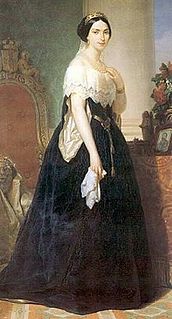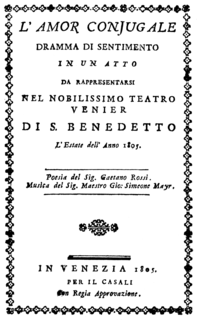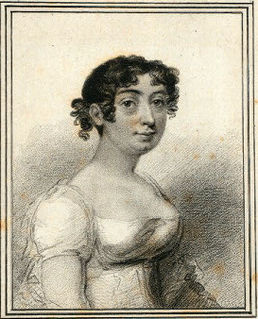
Le donne curiose is an opera in three acts by Ermanno Wolf-Ferrari to a text by Luigi Sugana after Carlo Goldoni's play of the same name.

Asrael is a leggenda or opera in four acts by composer Alberto Franchetti and librettist Ferdinando Fontana. The plot, based on German fairy tale and folklore, displays the conflict between the spirit of evil and the spirit of Christian love, represented by Asrael and Nefta respectively. The work is Franchetti's first opera and displays strong influences of Meyerbeer and Wagner, mixed with late 19th-century Italian idioms. The opera premiered at the Teatro Municipale di Reggio on 11 February 1888. The opera made its United States debut at the Metropolitan Opera on 26 November 1890 with Andreas Dippel in the title role.

Ferdinando Paer was an Italian composer known for his operas and oratorios. He was of Austrian descent and used the German spelling Pär in application for printing in Venice, and later in France the spelling Paër.

La leggenda di Sakùntala is a three-act opera by Franco Alfano, who wrote his own libretto, basing his work on Kālidāsa's 5th-century BC drama Shakuntala.

Giuseppina Ronzi de Begnis was an Italian soprano opera singer famous for the roles written for her by the prominent composers of the 1820s and 1830s. Her father, Gaspare, was a prominent ballet dancer and choreographer, and her mother, Antonia, a ballerina. Her brothers Stanislao and Pollione were opera singers. As a singer, she made her debut in Naples at the Teatro dei Fiorentini in 1814 in Giovanni Cordella's L'Avaro, followed by important engagements in Bologna in 1816, also appearing in Genoa, Florence; in 1817 as Giulia La Vestale, and in Bergamo. She married Italian bass Giuseppe de Begnis (1793–1849) when she was only 16. The marriage lasted only a few years and the two separated in 1825.
Euridice is an opera in a prologue and one act by the Italian composer Giulio Caccini. The libretto, by Ottavio Rinuccini, had already been set by Caccini's rival Jacopo Peri in 1600. Caccini's version of Euridice was first performed at the Pitti Palace, Florence, on 5 December 1602. Caccini hurriedly prepared the score for the press and published it six weeks before Peri's version appeared.

Adelaide Tosi was an Italian operatic soprano.

Le maître de chapelle, ou Le souper imprévu is an opéra comique in two acts by the Italian composer Ferdinando Paer. The French libretto, by Sophie Gay, is based on Le souper imprévu, ou Le chanoine de Milan by Alexandre Duval (1796).

Medea is an opera in three acts composed by Giovanni Pacini to a libretto by Benedetto Castiglia. It premiered on 28 November 1843 at the Teatro Carolino in Palermo, conducted by the composer with Geltrude Bortolotti in the title role. The libretto is based on the plays Medea by Euripides and Médée by Pierre Corneille.

L'amor coniugale is an opera in one act by Simon Mayr set to an Italian libretto by Gaetano Rossi. It premiered at Padua's Teatro Nuovo on 26 July 1805.

Teresa Bertinotti was a celebrated Italian soprano and voice teacher. She created leading roles in several operas, including Simon Mayr's Ginevra di Scozia.
La Lodoiska is an opera in three acts by Simon Mayr to an Italian libretto by Francesco Gonella De Ferrari. It was Mayr's second opera and premiered at La Fenice in Venice on 26 January 1796.

Giuseppe Siboni was an Italian operatic tenor, opera director, choir conductor, and voice teacher. He began his career in his native country in 1797 and actively performed in major Italian opera houses up through 1818. From 1806 to 1809 he performed successfully in London, and from 1810 to 1814 he was active in Vienna, where he enjoyed the friendship of Ludwig van Beethoven. He played a critical role in Danish musical life from 1819 until his death in 1839. In 1819 he joined the Royal Danish Theatre in Copenhagen, where he worked first as a singer and later as director of the opera chorus and head director. In 1827 he founded the Royal Conservatory of Music in Copenhagen. He was married three times during his life, including his second marriage to the sister of poet Franz von Schober. His third marriage produced a son, the composer and pianist Erik Siboni (1828–1892).

Alonso e Cora is an opera seria in three acts by Francesco Bianchi. The libretto was by Giuseppe Foppa, after Ferdinando Moretti's Idalide, o sia La vergine del sole, as used by Giuseppe Sarti in Milan in 1783. The original source of this text was in turn Jean François Marmontel's Les Incas, ou La destruction de l'empire du Pérou (1777).

Elisabetta Manfredini-Guarmani was an Italian opera singer best known for having created the leading soprano roles in four of Rossini's operas, roles which he wrote specifically for her voice. She was born Antonia Elisabetta Manfredini in Bologna and was the daughter of the composer and music theorist Vincenzo Manfredini. After her stage debut in 1810 when she sang in the premiere of Stefano Pavesi's Il trionfo di Gedeone at Bologna's Teatro del Corso, she went on to perform at La Fenice, La Scala, Teatro Regio di Torino, Rome's Teatro Argentina and several other opera houses, primarily in Northern Italy. In addition to the roles she created in Rossini's operas, she also sang in the world premieres of operas by several composers who are lesser known today, including Pietro Raimondi, Simon Mayr, and Ferdinando Paër. Her last known appearance was in 1828 after which there is no further trace of her. The date and place of her death are unknown.

The Teatro Alfieri was a major theatre and opera house in 18th and 19th century Florence, located at Via dell'Ulivo #6 corner Via Pietrapiana in the Florence, region of Tuscany, Italy.

Antonietta Fricci was an Austrian-born opera singer known for her performances in leading soprano and mezzo-soprano roles in the opera houses of Europe. She was married to the Italian tenor Pietro Neri-Baraldi from 1863 until his death in 1902.

Angelo Anelli was an Italian poet and librettist who also wrote under the pseudonyms Marco Landi and Niccolò Liprandi. He was born in Desenzano del Garda and studied literature and poetry at a seminary in Verona. In 1793 he enrolled in the University of Padua, receiving a degree in Canon and Civil Law two years later. Active in the politics of the Cisalpine Republic in his youth, he was imprisoned twice. His 1789 sonnet on the vicissitudes of Italy under Austrian domination, "La calamità d'Italia", was for a long time incorrectly attributed to Ugo Foscolo.
Giuseppe Ferdinando Brivio was an Italian composer, conductor, violinist, and singing teacher who is chiefly known for his operas. His work displays a natural expression and uses figurations similar to that of Antonio Vivaldi.
Vittorio Trento was an Italian composer born in Venice. He studied composition under Ferdinando Bertoni at the Conservatorio dei Mendicanti in Venice. He was primarily known for his ballets of which he composed more than 50 for Venetian theatres. In his later years he also composed a number of operas, including Teresa vedova, Ines de Castro, and Giulio Sabino nel suo castello di Langres. Trento died in Lisbon.













